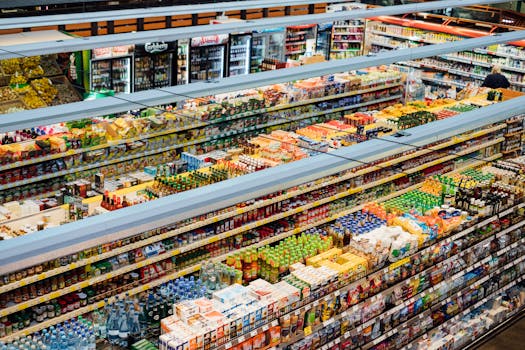As the global economy enters a new phase marked by shifting trade alliances, digital acceleration, and sustainability mandates, India’s Fast-Moving Consumer Goods (FMCG) export market is undergoing a profound metamorphosis. What was once a domestic consumption-led sector is now emerging as a significant contributor to global supply chains.
India’s FMCG exports—ranging from personal care and packaged foods to home care and health-oriented products—are growing at double-digit rates, fuelled by diaspora demand, contract manufacturing, digital trade infrastructure, and government support. But with growth comes complexity. The question before us is not whether Indian FMCG exporters can expand globally, but how they can build future-ready, resilient, and digitally optimized export strategies that endure volatility and seize emerging opportunities.

From Margin Play to Market Leadership: The Evolution of India’s FMCG Export Engine
India has traditionally been a cost-competitive supplier of FMCG products, especially to markets in Africa, the Middle East, and Southeast Asia. However, the 2025 landscape reflects a paradigm shift. Several concurrent forces are transforming the sector into a powerhouse of innovation, compliance, and private label manufacturing:
- Contract Manufacturing Surge: Global brands are outsourcing between 30–60% of their production to third parties. India, with its cost advantages and regulatory maturity, is now a critical hub for these activities.
- Private Label Ascendancy: Private label sales in the U.S. and Europe are outpacing national brands. Indian firms are capitalizing by offering compliant, scalable, and customized white-label solutions.
- Digital and E-Commerce Explosion: Global FMCG e-commerce is set to touch $1.8 trillion by 2025. Exporters are tapping into cross-border marketplaces and direct-to-consumer channels, transforming the traditional export sales model.
The Five Megatrends Reshaping Global FMCG Exports—and Why Indian Companies Must Adapt
Digital Transformation and Predictive Intelligence
AI and machine learning are revolutionizing the FMCG export lifecycle—from demand forecasting to inventory management and channel optimization. Leading players like Nestlé and P&G are deploying AI for real-time supply chain visibility, predictive analytics, and hyper-personalization.
At The Inflection Point, we’re integrating these principles into a proprietary ML-based Sales Strategy Optimizer, trained on historical trade flows, buyer preferences, macroeconomic shifts, and platform sales data. This model enables exporters to:
- Identify optimal markets and SKUs
- Anticipate seasonal demand shifts
- Recalibrate product-channel-price matrices dynamically
Clients can use it to sharpen entry strategies, manage credit risk, and improve customer lifetime value—whether through D2C, private label, or wholesale channels.
The Green Imperative: Sustainability as Strategy
Buyers and regulators in the EU, North America, and APAC increasingly demand verifiable sustainability credentials. The days of ‘compliance for compliance’s sake’ are over; sustainability is now central to global procurement and brand equity.
Indian FMCG exporters must proactively:
- Transition to recyclable, biodegradable packaging (50%+ of top Indian suppliers aim for this by 2027)
- Comply with EPR, EU Digital Product Passports, and traceability mandates
- Adopt regenerative sourcing and net-zero manufacturing targets
Those who embed ESG across the value chain—rather than treat it as a cost—will build enduring buyer relationships and command a premium.
Shifting Global Supply Chains and the Rise of ‘Geo-Efficiency’
From reshoring in the U.S. to nearshoring in the EU, global supply chains are being redesigned around resilience and geopolitics. India, with its neutral diplomatic positioning, competitive labour pool, and maturing trade infrastructure, is ideally placed to become a preferred sourcing partner.
But it’s not just about being in India—it’s about being logistics-smart in India. Future-ready exporters are:
- Diversifying supplier bases to avoid chokepoints
- Partnering with digital freight and 3PL platforms for end-to-end visibility
- Investing in cold chain and bonded warehousing near major ports
Logistics now determines competitiveness almost as much as product quality.
Premiumization and Personalization in Global Demand
International consumers, particularly in advanced economies, are trading up. The demand is no longer just for ‘Made in India’; it’s for:
- Vegan hair oils with EU-compliant allergens
- Clean-label ready-to-eat meals with transparent sourcing
- Ayurvedic skincare with QR-coded traceability
Exporters must think like global marketers and build SKU strategies around cultural nuances, health trends, and regulatory tailoring. Customization isn’t a luxury; it’s a necessity.
Policy Shifts and Compliance Complexity
From the EU Deforestation Regulation to the US FDA’s enhanced traceability, regulatory divergence is growing. Meanwhile, India’s RoDTEP, new FTA commitments, and the export focus of its PLI schemes are opening up new avenues—but only for those agile enough to navigate the maze.
Export success now hinges on dynamic compliance intelligence—the ability to interpret, implement, and operationalize new rules across jurisdictions without stalling growth.
FMCG Exporters Must Future-Proof on Three Fronts
To win the next decade of global FMCG trade, Indian companies must build capabilities across three critical vectors:
1. Sales Strategy Transformation
Static channel plans and generic value propositions are outdated. Exporters must embrace:
- Predictive market prioritization (AI-driven)
- Micro-segmented customer personas (wholesalers, private label buyers, e-commerce aggregators)
- Dynamic pricing and bundling for diverse geographies
At The Inflection Point, we’ve helped clients build adaptive sales playbooks—leveraging data science, buyer behaviour analytics, and platform intelligence. Whether it’s breaking into Carrefour’s private label in the Middle East or identifying niche snack categories for Amazon EU, tailored strategies win.
2. Value Chain Rewiring
Speed, agility, and traceability define modern export supply chains. Exporters must:
- Integrate smart-factory retrofits and automation to reduce turnaround time
- Build digital twins of supply chains to pre-empt disruptions
- Partner with regional packaging and logistics providers who offer traceability and sustainability guarantees
India’s contract manufacturing and packaging ecosystem is mature but underutilized. Strategic alliances—not mere transactional sourcing—will be the differentiator.
3. Brand, Compliance & Buyer Experience
Even unbranded or white-label exporters must now act like B2B brands. That means:
- Investing in digital collateral, transparency dashboards, and traceable sourcing
- Engaging with buyers through multi-touchpoint journeys (trade shows, marketplaces, direct outreach)
- Offering “compliance as a service” — region-ready packaging, localized claims, and on-demand documentation
Future winners will treat compliance as an experience, not an obligation.
The Opportunity: An Indian FMCG Export Revolution in the Making
India’s FMCG export story is just beginning. With expected CAGR of 15–17% through 2030, key drivers include:
- Rising global interest in ethnic, natural, and wellness products
- Government incentives like RoDTEP and trade pacts with UAE, Australia, UK
- Digitally enabled MSMEs tapping marketplaces and D2C exports
- Investment in port modernization and bonded logistics parks
However, only those who proactively digitize, diversify, and differentiate will realize the full potential.
Conclusion: From Exporters to Ecosystem Builders
India must stop viewing exports as a transactional play and start seeing itself as a global FMCG ecosystem builder—offering scalable, sustainable, and smart solutions to the world.
FMCG companies, packaging innovators, logistics partners, and service providers must collaborate across a shared vision of value, velocity, and verifiability. The role of AI and ML, not as add-ons but as embedded infrastructure, will define leadership.
We’re at a pivotal moment—one that rewards foresight over familiarity.
Let’s Talk
If you are building or scaling your business and want to:
- Explore new markets backed by data-driven strategy
- Build future-ready sales operations and channel architectures
- Customize our AI-based Sales Strategy Optimizer to power your go-to-market efforts
…We would love to connect.
We are also releasing a detailed report on the Future of FMCG Exports from India 2025–rich with insights, market breakdowns, and strategy frameworks. If you would like access, contact us.
